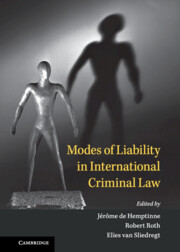Book contents
- Modes of Liability in International Criminal Law
- Modes of Liability in International Criminal Law
- Copyright page
- Contents
- Biographies
- Acknowledgements
- Abbreviations
- 1 Cross-Cutting Issues
- Part I Individual Commission
- 2 Direct Commission
- 3 Indirect Commission
- 4 Improper Omission
- Part II Joint Commission
- Part III Participation
- Part IV Participating in Group Activities
- Part V Inchoate and Preparatory Acts
- Part VI Other Forms of Responsibility
- Part VII Concluding Observations
- Index
- References
4 - Improper Omission
from Part I - Individual Commission
Published online by Cambridge University Press: 01 July 2019
- Modes of Liability in International Criminal Law
- Modes of Liability in International Criminal Law
- Copyright page
- Contents
- Biographies
- Acknowledgements
- Abbreviations
- 1 Cross-Cutting Issues
- Part I Individual Commission
- 2 Direct Commission
- 3 Indirect Commission
- 4 Improper Omission
- Part II Joint Commission
- Part III Participation
- Part IV Participating in Group Activities
- Part V Inchoate and Preparatory Acts
- Part VI Other Forms of Responsibility
- Part VII Concluding Observations
- Index
- References
Summary
When major crimes are committed on a broad scale, most of the people who may be held criminally liable for these crimes have actively taken part in them. Yet some of those morally and politically responsible for these crimes have not undertaken any action. Therefore, criminal prosecutors and judges must also analyse the conduct of people who did not act but whose conduct may nevertheless amount to international crimes. The basis for this operation is simple when a criminal provision specifically addresses the conduct of the person who omits to act; this situation is known as proper omission. By contrast, when no specific criminal provision regarding the omission to act is available, liability results from a legal construction the conditions of which will be discussed in the present chapter.
- Type
- Chapter
- Information
- Modes of Liability in International Criminal Law , pp. 58 - 82Publisher: Cambridge University PressPrint publication year: 2019

